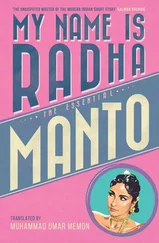Too much good health can also come to seem like an illness. And Raj Kishore, though he possessed all the beauty a young man can possess, was in the habit of making a vulgar exhibition of it. He’d be talking to you, and at the same time, flexing a bicep. A serious discussion could be going on, say about independence, and he’d stand there, the buttons of his khadi kurta open, measuring the width of his chest.
The mention of his khadi kurta reminds me that Raj Kishore was an ardent Congress supporter. This was why he wore khadi, and yet I always suspected he didn’t love his country nearly as much as he loved himself.
Many would feel that my description of Raj Kishore was unfair. Everyone, in and out of the studio, was an admirer of his body, his opinions, his simplicity and of course, his distinctive, Rawalpindi style of speaking.
Unlike the other actors, Raj Kishore was neither aloof nor unapproachable. If the Congress staged a demonstration, he would certainly be there. If there was a literary gathering, he was sure to be present. He even took time out from his busy schedule to be there for his neighbours and acquaintances when they were in trouble.
All the film producers respected him because the purity of his character was well known. Forget film producers, even the public knew that Raj Kishore was a man of moral fibre. And for any man to be part of the film world and remain free from the taint of scandal, is no small achievement. Raj Kishore was a successful actor, but it was these unique qualities that placed him on an even higher pedestal.
In the evenings, outside the paan shop in Nagpara, talk would invariably turn to the lives of actors and actresses. Virtually each one had some scandal or another linked to their name, but whenever Raj Kishore’s name came up, Sham Lal, the paanwallah, would say with great pride: ‘Manto saab, Raj bhai is one actor who knows to keep his dick in his trousers.’
How he’d come to call him ‘Raj bhai’, I don’t know. But it didn’t surprise me. Even the most ordinary things about ‘Raj bhai’ were turned into great feats and reached the ears of ordinary people. They knew how he spent his income — what he sent to his father; what he donated to orphanages; what he kept for himself — as if they’d been made to learn it by heart.
Sham Lal told me one day that Raj bhai had very good relations with his stepmother. In the days when he had no money, his father and his new wife had tormented him constantly, but it was to his credit that when the time came, he did his duty by them, providing them with a comfortable life. They now slept on big beds, lording over people. Every morning, Raj went and saw his stepmother, even touching her feet. He stood with folded hands before his father and gave him anything he asked for. Now don’t take it amiss, but I’d become irritated whenever I heard Raj Kishore praised in this way. God, alone, knows why!
As I’ve said before, I didn’t really hate him. He never gave me any reason to. And in that time when clerks were given no respect, he often sat for hours talking to me. So I can’t say that there was a reason, but a doubt, which had all the force of a conviction, struck like lightning in a dark corner of my mind, telling me that Raj was posturing; that his entire life was somehow fraudulent. The problem was that I couldn’t find anyone of the same mind as me — people worshipped him like a god — and this bothered me deeply.
Raj had a wife and four children; he was a good husband and a good father; there was no corner of this stainless cover that could be lifted to reveal a dark element in his life.
He was everything he appeared to be. And yet, I was racked with doubt.
Believe me, I chided myself on many occasions. I felt I must truly be perverse for harbouring suspicions about a man the whole world thought so well of and who I, myself, had no cause for complaint about. What did it matter that he admired his own admittedly attractive physique? If I had such a physique, I would in all likelihood do the same.
But I was never able to come round to seeing Raj Kishore the way others did and was often nettled by him. He’d say something I didn’t like and I’d pounce on him. Our bouts would invariably end with him smiling and me, left with a bad taste in my mouth, more troubled than ever.
There wasn’t a hint of scandal in his life. Besides his wife’s, no other woman’s clean or dirty laundry could be linked to his name. I should also mention that he referred to all the other actresses as ‘sister’; and they, in turn, referred to him as ‘brother’. This only raised more questions in my mind. Why was it necessary to establish these intimacies? A brother and sister’s relationship was something apart; why call all women your sisters as if you were putting up a ‘Road Closed’ or ‘It Is Forbidden to Urinate Here’ sign?
If you weren’t planning on having a sexual relationship with a woman, why make an announcement? If no thought of a woman other than your wife could enter your mind, why run an advertisement about it? I couldn’t understand it and this upset me.
But, anyway! The Beauty of the Forest ’s shooting continued; the studio was especially busy; women extras came regularly and our day would be spent laughing and joking with them.
One morning, the makeup artist who we called Ustad arrived in Nayaz Muhammad Villain’s room with news that the new girl, meant to be playing the part of the vamp, had arrived and was to begin work imminently. We were on a break at the time, and the effect of hot tea along with this little bit of news fired us up. The arrival of a new girl in the studio was always cause for commotion. And so we emptied out of Nayaz Muhammad Villain’s and set off in the hope of catching a glimpse of her.
In the evening, at the time when Harmzji Framji left his office for the billiards room, pressing two fragranced paans from Isa the tabla player’s silver box into his wide cheek, we caught sight of the girl.
She was dark-skinned; and that was all I was able to discern. She was shaking hands with a businessman, then hurriedly got into the studio car and drove away. I ran into Nayaz Muhammad a few moments later, who was only able to say that she had thick lips; that was perhaps all he had been able to see of her. Ustad, who might not have even seen that much, shook his head and grunted, ‘Hoonh… Condemn,’ which meant bullshit.
Four or five days passed, but the new girl didn’t appear at the studio. On the fifth or sixth day, as I was leaving Gulab’s Hotel after a cup of tea, I ran straight into her.
I have always preferred to observe women furtively, with sidelong glances. If a woman appears suddenly, and directly, in front of me, I’m unable to make her out. And because we ran straight into one another, I wasn’t able to discern her face or features. I did, however, see her feet, on which she wore fashionable new slippers.
The studio’s owners had gravelled the path that led from the laboratory to the studio. There were countless small round pebbles, on which the shoe routinely slipped. And because her slippers were open, she walked with some difficulty.
But after this meeting, my friendship with Ms Neelam began gradually to grow. The studio people knew nothing of it, even though we came to be on fairly informal terms, and really quite close. Her real name was Radha. I once asked her why she had dropped such a pretty name. ‘Just like that,’ she replied, then a moment later, added, ‘It’s such a pretty name that I wouldn’t want it to end up in a film.’
This remark might perhaps make you think that Radha was religious. Not in the slightest; she had no feeling whatsoever for religion and its superstitions. But just as I, before beginning any new writing, always inscribe the numerals denoting Bismillah—7, 8, 6—on the page, she had, even perhaps without meaning to, a special affection for the name Radha.
Читать дальше












